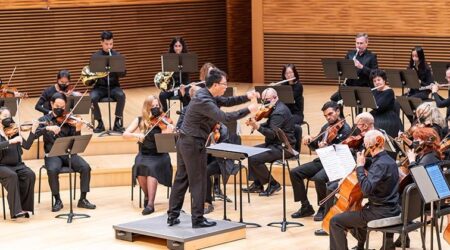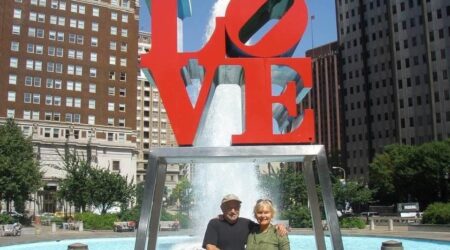Khodorkhovsky
In the opening scenes of the new documentary about the world’s wealthiest state prisoner, German filmmaker Cyril Tuschi explains that his ambivalence concerning his subject’s character and political situation was the reason he decided to embark on this project. A dedicated socialist, Tuschi admits that he initially saw Mikhail Khodorkhovsky as the kind of […]
 In the opening scenes of the new documentary about the world’s wealthiest state prisoner, German filmmaker Cyril Tuschi explains that his ambivalence concerning his subject’s character and political situation was the reason he decided to embark on this project. A dedicated socialist, Tuschi admits that he initially saw Mikhail Khodorkhovsky as the kind of ruthless philistine capitalist that his progressive parents warned him about as a child. But his curiosity was aroused by the oligarch’s decision to return to Russia and face certain imprisonment rather than live abroad in freedom like many of his colleagues. Over the course of the film, the director’s feelings grow into something resembling admiration, climaxing in a moving interview with the eponymous protagonist at his most recent trial.
In the opening scenes of the new documentary about the world’s wealthiest state prisoner, German filmmaker Cyril Tuschi explains that his ambivalence concerning his subject’s character and political situation was the reason he decided to embark on this project. A dedicated socialist, Tuschi admits that he initially saw Mikhail Khodorkhovsky as the kind of ruthless philistine capitalist that his progressive parents warned him about as a child. But his curiosity was aroused by the oligarch’s decision to return to Russia and face certain imprisonment rather than live abroad in freedom like many of his colleagues. Over the course of the film, the director’s feelings grow into something resembling admiration, climaxing in a moving interview with the eponymous protagonist at his most recent trial.
Khodorkhovsky began his ascent to wealth and power as a leader of his university’s Komsomol (Young Communist League) in the early 1980’s. Perhaps initially he was even a true believer, though Khodorkhovsky admits that people’s faith in Socialism had mostly waned by this time in the Soviet Union. Upon graduating, he and his young entrepreneurial colleagues immediately thrived under the unprecedented economic and social liberalism of perestroika and glasnost. Khodorkhovsky’s wealth and influence soared, earning him the post of Deputy Minister of Fuel and Energy in Russia’s first democratically elected government. He was thus well-placed to reap the rewards of Yeltsin’s fire sale of national industries in the mid-1990’s, eventually becoming the Chairman and CEO of the Yukos Oil Company and the wealthiest man in Russia. He became a sex symbol too: a female acquaintance informed me that as a girl she, along many of her girlfriends in Voronezh, had a major crush on the young capitalist.
The antagonist in this story is Vladimir Putin, Russia’s fearless leader and (currently) its wealthiest citizen, who comes off as an overwrought, vindictive, emotionally unstable, and paranoid figure in the film. He implies that the decision to terminate Yukos and liquidate its assets was made to stop certain people from continuing to steal from the Russian people, a perspective adopted by many of his countrymen in the wake of Khodorkhovsky’s arrest and conviction. Earlier in the film, economists and advisers to Gorbachev and Yeltsin point out that selling state resources to Russian “oligarchs” at cut-rate prices was the only way to keep them inside the country, as no Russian citizen at the time would have been able to buy them at their market value. All of Russia’s resources and major industries would have been appropriated by foreign interests. Several of Khodorkhovsky’s former associates are shown in exile in Israel, while his son is interviewed in and around his modest Brighton Beach apartment. Early in the film, Khodorkhovsky fervently proclaims himself to be a Russian, despite official and unofficial efforts to label him as something else. Considering the Jewish background of Khodorkhovsky and many of his business partners, Putin’s noble desire to give back the oil and wealth amassed by Yukos to the “Russian” people might imply a policy of anti-Semitism, though such conclusions are best left to the viewer’s judgment.
Knowing with absolute certainty that returning to Russia from a brief visit to his son in America would mean arrest and prosecution, Khodorkhovsky refused to abandon his native land. To be fair, the administration told him precisely what would happen, preferring to seize his assets while he remained abroad rather than potentially turning him into a political martyr at home. Khodorkhovsky’s decision to return placed him on the moral high ground, which may turn out to be the key to his ultimate salvation. He has said that he is no Count of Monte Cristo, plotting his revenge against those that took everything away from him. Perhaps he is more like the ghost of Hamlet’s father, his specter haunting the Kremlin and the Russian conscience, awaiting justice and restitution, oddly reminiscent of another specter that once haunted Europe. And like the exiled Russian intellectuals and dissidents of Czarist and Soviet Russia, his former colleagues anxiously follow his fate from abroad, London again serving as a major outpost as it once did for Herzen, Bakunin, Nabokov, and so many other political emigres. While Khodorkhovsky bides his time in prison, awaiting a more favorable political climate, his support abroad continues to mount, moving beyond moderate, free-market advocates to radicals like Tuschi and others from all sides of the political spectrum. He has become the world’s most famous dissident in the 1%, a figure on everyone’s mind at the recent Russian demonstrations that protested, among other issues, Putin’s controversial reelection.
As Tuschi points out, Khodorkhovsky is not your prototypical social crusader, let alone a revolutionary. His indefinite prison sentence was the result of a modest effort to push for a greater degree of transparency and accountability on the part of the government and corporations in his country. Inspired by his conscience and/or the realization that better business practices would ultimately lead to greater earnings, Khodorkhovsky went from being possibly the most corrupt oligarch in the nation to its greatest reformer. His biggest crime, apart from supporting Putin’s political rivals, seems to be his proposal on public television to President Putin to initiate these reforms on a national level. Earlier in this same meeting with Russia’s oligarchs, Putin had reluctantly announced that Yukos had met its tax obligations. Weeks later, Khodorkhovsky was arrested and Yukos was disbanded on a charge of tax evasion.
By Oleg Ivanov
Oleg Ivanov would like to thank his anonymous source for her candor. Also, check out his weekly film blog “The Obscure Art of Cinema” at Metro New York.





